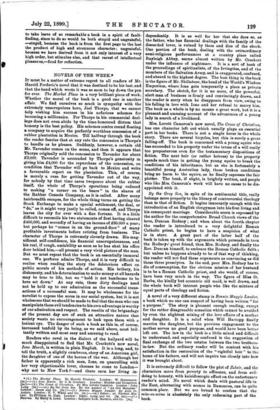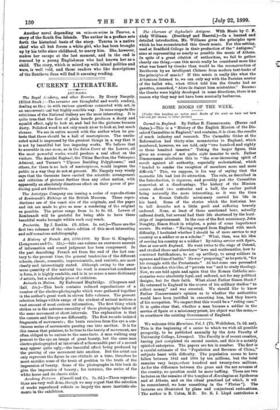NOVELS OF THE WEEK.*
IT must be a matter of extreme regret to all readers of Mr. Harold Frederic's novel that it was destined to be his last, and that the hand which wrote it was so soon to lay down the pen for ever. The Market Place is a very brilliant piece of work. Whether the moral of the book is a good one is another affair. We find ourselves so much in sympathy with the extremely unscrupulous hero, Joel Thorpe, that we cannot help wishing him success in his nefarious schemes for becoming a millionaire. For Thorpe in his commercial deal- ings does not even abide by the time-honoured dictum that honesty is the best policy. His schemes centre round floating a company to acquire the perfectly worthless concession of a robber plantation in Mexico. Till halfway through the book the reader fancies that at any rate the concession is Thorpe's to handle as he pleases. Suddenly, however, a certain old Mr. Tavender comes on the scene, and then it appears that Thorpe originally sold the concession to Tavender for about £3,000. Tavender is astounded by Thorpe's generosity in giving him £4,000 for the repurchase of the concession, on condition that Tavender will go back to Mexico and write a favourable report on the plantation. This, of course, is merely a ruse for getting Tavender out of the way, for nobody by that time cares twopence about the rubber itself, the whole of Thorpe's operations being reduced to making "a corner on the bears" in the shares of the Rubber Consols Company, as it is called. After many hairbreadth escapes, for the whole thing turns on getting the Stock Exchange to make a special settlement, the deal, or "do," as it might very justly be called, comes off, and Thorpe leaves the city for ever with a fine fortune. It is a little difficult to reconcile his two statements of first having cleared £400,000, and secondly of having an income of £80,000 a year; but perhaps he "comes in on the ground-floor" of many profitable investments before retiring from business. The character of Thorpe is extremely cleverly drawn. His mag- nificent self-confidence, his financial unscrupulousness, and his real, if rough, amiability as soon as he has shut his office door behind him,—all present a very vivid picture of the man. But we must repeat that the book is an essentially immoral one. We perforce admire Thorpe, and it is very difficult to realise when reading the story the deleterious effect on public morals of his methods of action. His bribery, his dishonesty, and his determination to make money at all hazards may be true to life, but we "hold it not handsome to be here set down." At any rate, these dirty dealings need not be held up to our admiration as the successful trans- actions of a successful man. It may be wholesome for the novelist to expose the sores in our social system, but it is not wholesome that we should be made to feel that the man who can manipulate these evil tendencies to his own advantage is worthy of our admiration and respect. The results of the brigandage of the present day are of such an attractive nature that society wants no encouragement to look upon them with a lenient eye. The danger of such a book as this is, of course, increased tenfold by its being, as we said above, most bril- iantly written and most easy and amusing to read.
Readers who revel in the dialect of the kailyard will be much disappointed to find that Mr. Crockett's new novel, lone March, is written in plain English. It is a long, and, to tell the truth, a slightly cumbrous, story of an American girl, the daughter of one of the heroes of the war. Although her father is apparently a rich man, lone, on quarrelling with her very objectionable lover, chooses to come to London— why not to New York P—and there earn her living in-
• (1.) The Market Place. By Harold Frederic. London : W. Heinemann. [6s.]—(2.) lone March. By S. It. Crockett. London : Hodder and Stoughton. [6.s.]—(3.) The Craze of C'hristina. By Mrs. Lovett Cameron. London : John Long. [68.]—(4.) By the Grey Sea. By the Author of "An Old Marquise." Lohdon : Sands and Co. [6s.]—(5.) Bonnie Maggie Lauder. By Alan Sc. Aubyn. London : F. V. White and Co. [6s.]—(6.) Zolreir ; or, Turkish Mts. rule. By (William St. Clair. London : Digby, Long, and Co. (as. 6d.)—( 7.) Taurua. By Emily S. Lond. London : Sampson Low, Marston, and Co. [Cs.]
dependently. It is as well for her that she does so, as the father, who has financial dealings with the family of the discarded lover, is ruined by them and dies of the shock. One portion of the book, dealing with the extraordinary semi-religions performances at a country place called Rayleigh Abbey, seems almost written by Mr. Crockett under the influence of nightmare. It is a sort of hash of the proceedings of spiritualists, of the Irvingites, and of the members of the Salvation Army, and is exaggerated, confused, and absurd to the highest degree. The best thing in the book is the figure of Mr. Shillabeer, the head of the World's Wisdom Emporium, where lone gets temporarily a place as private secretary. The sketch, for it is no more, of the powerful, alert man of business is firmly and convincingly drawn, and the reader is sorry when he disappears from view, owing to his falling in love with lone and her refusal to marry him. The book as a whole is by no means a great work, but it is a pleasant and amusing account of the adventures of a young lady in search of a livelihood.
Mrs. Lovett Cameron's new novel, The Craze of Christina, has one character left out which usually playa an essential part in her books. There is not a single horse in the whole story. There are several bicycles, but this is surely a great falling-off. The book is concerned with a young squire who has succeeded to his property under the terms of a will really too preposterous even for the testamentary dispositions of fiction. The next heir (or rather heiress) to the property spends much time in getting the young squire to break the conditions of his inheritance, but as she is fortunately a beautiful young Australian lady, these broken conditions bring no harm to the squire, as he finally espouses the fair plotter. The book, if slight, is brightly written, and people who like Mrs. Cameron's work will have no cause to be dis- appointed with it.
By the Grey Sea, in spite of its sentimental title, really belongs more properly to the library of controversial theology than to that of fiction. It begins innocently enough with the introduction of an English clergyman into his first living and his consequent marriage. Considerable scorn is expressed by the author for the comprehensive Broad Church views of the hero, Duncan Rodney ; and when about the fourth chapter the reader is introduced to a very delightful Roman Catholic priest, he begins to have a suspicion of what is in store. A great part of the latter half of the book is taken up with the arguments which persuade in turn the Rodney' great friend, then Mrs. Rodney, and finally the Rev. Duncan himself, to embrace the Roman Catholic faith ; but unless he happens already to be of that way of thinking, the reader will not find these arguments as convincing as did these three proselytes. In the end, poor Mrs. Rodney has to die of consumption, for the obvious mission of her husband is to be a Roman Catholic priest, and she would, of course, have been very much in the way. The figure of Miss St. Barbe, the kindly but eccentric old maid, is well drawn, and the whole book will interest people who like the mixture of equal parts of theology and fiction.
A novel of a very different stamp is Bonnie Maggie Lauder, a book which no one can suspect of having been written "for a purpose." The story is pleasant enough reading, except for the rather disagreeable sensation which cannot be avoided by even the slightest mixing of the love affairs of a mother and daughter. It is a relief when Will Hartopp finally marries the daughter, but the previous engagement to the mother serves no good purpose, and would have been better left out. The law in the book is a little mixed and difficult to understand, and especially confused is the suggestion of final exchange of the two estates between the two brothers- in-law. But the ordinary reader will be content with his satisfaction in the restoration of the " rightful heir S' to the home of his fathers, and will not inquire too closely into how it was brought about.
It is extremely difficult to follow the plot of Zubeir, and the characters move from poverty to affluence, and from evil- doing to honesty, with kaleidoscopic effect on the unfortunate reader's mind. No novel which deals with pastoral life in • the East, alternating with scenes in Damascus, can be quite common place. But we are bound to confess that the mise-en-scene is absolutely the only redeeming part of the book. Another novel depending on mise-en-scbree is Taurua, a story of the South Sea Islands. The author in a preface sets forth the historical basis of the story. Tanrua is a native (thief who all but forces a white girl, who has been brought up by his tribe since childhood, to marry him. She, however, makes her escape at the last moment, and in the end is rescued by a young Englishman who had known her as a child. The story, which is mixed up with island politics and wars, is well told, and those readers who like descriptions of the Southern Seas will find it amusing reading.



































 Previous page
Previous page